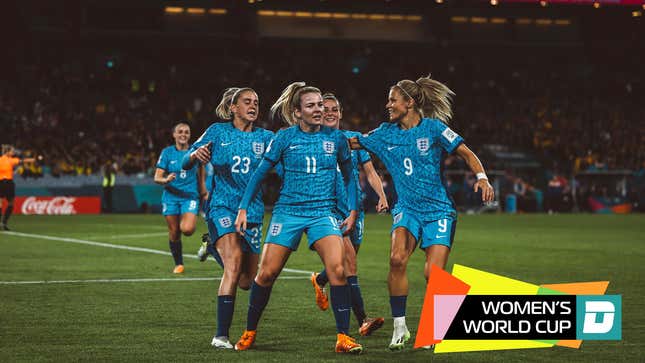
As tough as it is not to have the U.S. Women’s National Team in the FIFA Women’s World Cup final after winning the last two tournaments, the Spain-England final on Sunday is arguably better for the overall health of the game worldwide.
And England’s 3-1 win over Australia in the wee hours on Wednesday shows there are many storylines to be had in this tournament depending on where you sit. The Lionesses reach a World Cup final, the first England team to do that since 1966 when the men’s team’s run prompted all those “football’s coming home” chants that will be ubiquitous before the final on Sunday.
And the Matildas have become a phenomenon for the World Cup host nation. The Gist reported that Australia’s quarterfinal win over France was the most watched program in over 20 years, as 7.2 million people tuned in. Australia’s Steph Catley reflected on the team’s immense popularity after the loss while interviewed for the Australian sports network Optus Sport.
“It’s been absolutely incredible, I can’t even put it into words, to be honest,” Catley said. “Yeah, sorry I’m getting a little bit emotional. Even coming into the ground and seeing the thousands of people flocking to the stadiums waving at the bus, you see the full pubs and people watching the game what we’ve seen on social media, what we’ve seen in the crowd it’s changed the women’s game forever and women’s sport in general I think people are finally seeing it for what it is and a step in the right direction.”
Spain reached the final by defeating Sweden 2-1 on Tuesday in an exciting match where Sweden tied the game late only to have Spain immediately score again for the final margin.
The British women won the 2022 Euros and, like in the U.S., the nation is discovering its women’s team might be better than its men’s on the international stage.
This team has been a juggernaut in the last few years as the U.S. is losing the head start in training and opportunity brought on by Title IX and strong collegiate programs. England has its own pro league with teams tied to the Premier League for better or worse. Nationally, the United Kingdom has spent the better part of a decade attempting to right-side the inequities that stemmed from decades of neglecting, if not banning, women’s sports.
English women once drew epic crowds for soccer games. Back in 1921, after 50,000 fans showed up to watch a women’s match in Liverpool, the Football Association banned women from playing in regulation matches. It was 50 years before the ban was lifted. And to make things worse, some European and Latin American countries followed the UK’s lead. Brazil banned women from the game until 1979.
So as American girls were getting some of the first college soccer scholarships, their sisters around the world had spent two generations on the sidelines. It has been another 50 years and the infrastructure and culture of play are just now bearing fruit in world competition.
You can read about this history in Sue Anstiss’ look at the history and promise of UK women’s sports in Game On. Her book prompted a Netflix documentary to look at the women who are surging in national and international competition there.
A shaky U.S. team went out in the round of 16 to Sweden and prompted all manner of grievance among those who simultaneously don’t actually care about women’s sports but also expect America to win gold.
While the American sports networks were obsessed with American football during their Wednesday morning shows, two Spanish-language networks, ESPN Deportes and Telemundo ran with highlights and analysis of the Lionesses win.
The popularity and ratings of this World Cup are important. It’s worth remembering that European networks were in a standoff with FIFA, which for the first time charged for rights to broadcast the Women’s World Cup. If you look at the history of economics, people often balk at paying for something that has been free, and FIFA has spent decades conveying a lack of respect for the women’s tournament.
But it will be difficult to deny the value of the women’s game after this tournament. Full and enthusiastic record crowds, early-round upsets, and record-breaking ratings in unexpected places will have a far more lasting impact than the petty critique of a once-dominant USWNT.